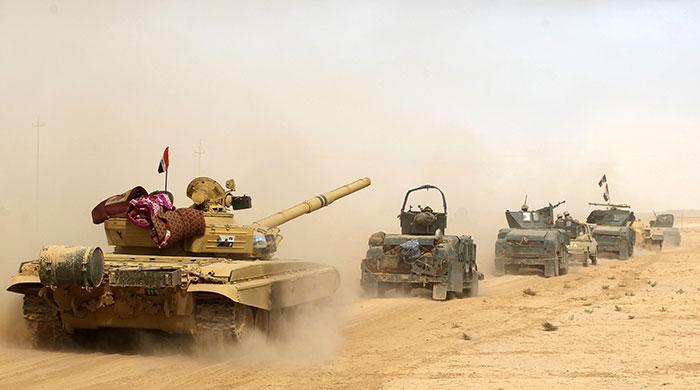Iraq forces advance on Daesh stronghold of Mosul
October 18, 2016

AL-SHURA, IRAQ: Iraqi forces advanced Monday in an offensive aimed at retaking Mosul and dealing a death blow to the Daesh’s "caliphate" in the city where it was declared two years ago.
The start of the long-awaited assault raised deep concerns for hundreds of thousands of civilians trapped in Iraq’s second-largest city, with aid groups warning of a massive humanitarian crisis.
Some 30,000 federal forces are leading the offensive, backed by air and ground support from a 60-nation US-led coalition, in what is expected to be a long and difficult assault on Daesh’s last major Iraqi stronghold.
Iraqi forces readied weapons and ammunition as columns of armoured vehicles headed towards Mosul from the town of Al-Shura, some 45 kilometres (30 miles) south of the city.
The Pentagon described the operation as a "decisive moment" in the fight against Daesh, but the US-led coalition’s top commander warned it could last weeks or more.
Prime Minister Haider al-Abadi announced the beginning of the assault in a televised address early Monday.
"Today I declare the start of these victorious operations to free you from the violence and terrorism of Daesh," Abadi said.
Daesh seized control of large parts of Iraq and neighbouring Syria in mid-2014, declaring a cross-border "caliphate" and committing widespread atrocities.
Toughest battle yet
The militants have suffered a string of territorial defeats this year in both countries, and the retaking of Mosul would all but end their presence in Iraq as a land-holding force.
Iraqi forces have been closing in on Mosul in recent weeks but the battle begun Monday could be the toughest yet against Daesh.
Daesh forces are vastly outnumbered, with the US military estimating 3,000 to 4,500 militants in and around Mosul.
But they have had months to prepare and will seek to use hit-and-run tactics, ambushes, snipers, bombs, berms and trenches to slow down and bleed Iraqi forces.
In an online statement after the assault began, Daesh claimed it launched a series of deadly suicide car bombings against Iraqi forces.
Early Monday, federal forces moved from their main staging base of Qayyarah, south of Mosul, as peshmerga forces from the autonomous Kurdish region advanced from the east.
Around 4,000 Kurdish peshmerga took part in a push to reclaim villages once inhabited by members of the Christian and Kakai minorities, a statement said.
Several villages were promptly recaptured and peshmerga forces had moved to the edges of Qaraqosh and Bartalla, two Christian towns Daesh seized in August 2014, commanders said.
At a staging area near Khazir village east of Mosul, Kurdish forces fired artillery and rockets as smoke rose from houses in the distance.
The United Nations and other aid organisations warned that a huge number of civilians were in immediate danger.
"I am extremely concerned for the safety of up to 1.5 million people," the UN deputy secretary general for humanitarian affairs and emergency relief, Stephen O’Brien, said.
Exodus fears
The UN’s humanitarian coordinator in Iraq, Lise Grande, told reporters that an exodus could begin within a week and some aid groups worried about preparedness.
"It is estimated that as many as 200,000 people could flee from the city in these first weeks, though there are currently only 60,000 tents available in seven emergency camps," the International Rescue Committee said.
In London, Saudi Foreign Minister Adel al-Jubeir said Riyadh had urged Iraq’s government not to let militias enter Mosul, fearing "mass atrocities".
Iraqi forces advancing on multiple fronts are some distance from Mosul and are expected to eventually take up positions on the city’s edge and lay siege before breaching its boundaries and directly engaging die-hard militants.
"This operation to regain control of Iraq’s second-largest city will likely continue for weeks, possibly longer," warned Lieutenant General Stephen Townsend, commander of the US-led coalition.
Most of the coalition’s support has come in the shape of air strikes and training, but US, French and British special forces are also on the ground to advise local forces.
"This is a decisive moment in the campaign to deliver ISIL a lasting defeat," US Secretary of Defence Ash Carter said, using an alternative acronym for Daesh.
President Recep Tayyip Erdogan on Monday indicated that Turkey would also play a role in the offensive despite concerns raised by Baghdad.
"We will be in the operation and we will be at the table," Erdogan said in a televised speech. "It is out of the question that we are not involved."
Last stand
As the biggest Iraqi military operation since the 2011 withdrawal of US troops unfolded, a Turkish delegation arrived in Baghdad for talks and coalition defence ministers agreed to meet in Paris on October 25 to take stock.
Daesh once controlled more than a third of Iraq’s territory but its self-proclaimed "state" has been shrinking steadily.
It lost its emblematic bastion Fallujah in June, the Anbar provincial capital Ramadi months earlier and on Sunday Syrian rebels retook the town of Dabiq, which held special ideological significance for the group.
If Mosul falls, only Raqa in Syria would remain as the last major city in either country under IS control.
But even the recapture of Mosul will not mark the end of the war against Daesh, which is likely to increasingly turn to insurgent tactics as it loses more ground.
Just hours after the offensive began, Daesh claimed responsibility for a suicide car bombing targeting an Iraqi army checkpoint south of Baghdad that killed at least 10 people.
The militants have claimed a string of deadly bombings in Baghdad in recent days.











